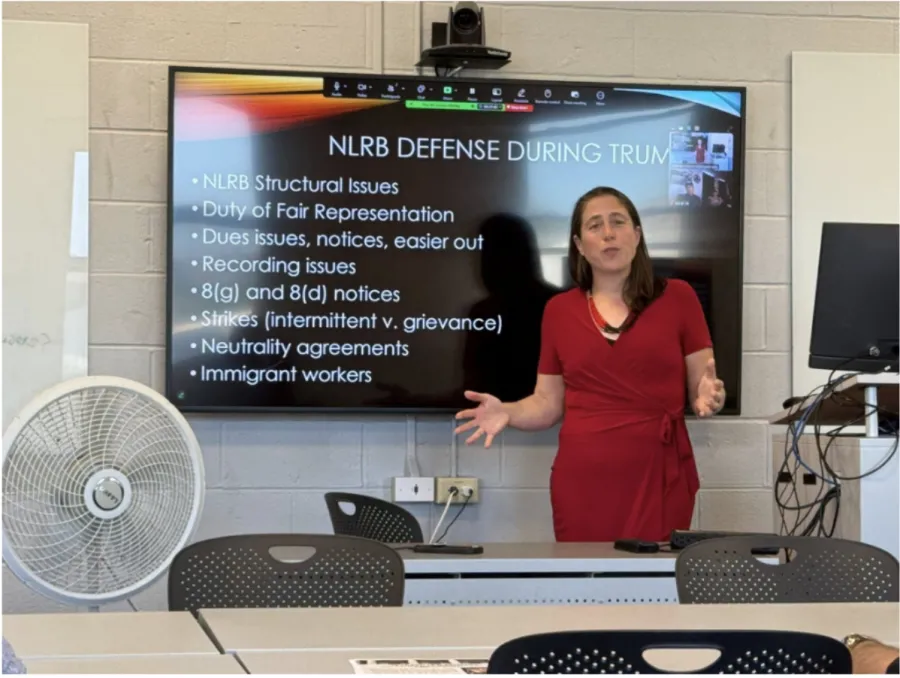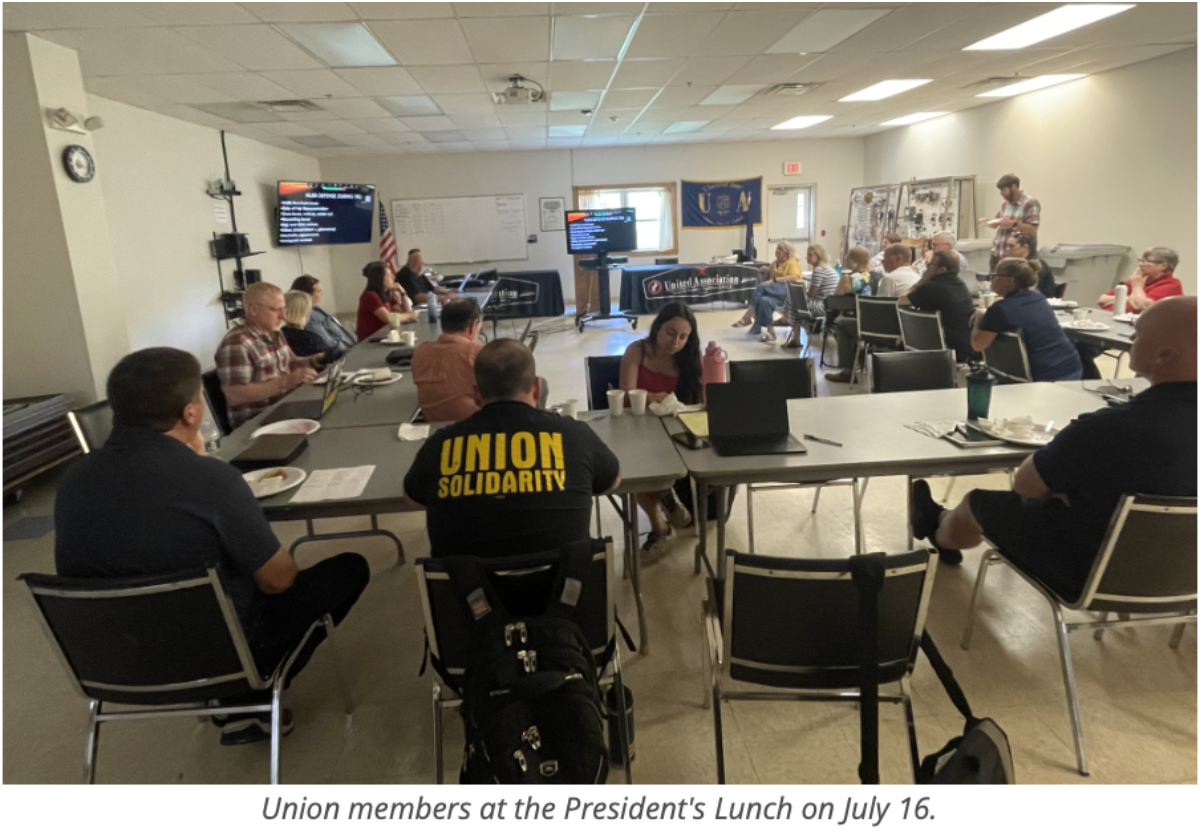Former NLRB Deputy General Counsel Discusses Attacks on Workers’ Rights in Washington

PHOTO: Former NLRB General Counsel Jessica Rutter giving a presentation in Maine.
Last month Jessica Rutter, former Acting General Counsel for the National Labor Relations Board, gave a presentation at a Maine AFL-CIO President's Lunch in Augusta about the Trump administration’s attacks on workers’ rights and what to do about it. Rutter briefly served as Acting NLRB General Counsel after President Donald Trump fired General Counsel Jennifer Abruzzo in January. During the same period the President also fired NLRB member Gwynne Wilcox, denying the board a quorum to rule on labor disputes.
Rutter said the loss of the quorum allows employers to more easily throw up road blocks to union elections by appealing unfair labor practices complaints and election results from regional boards to the national board. Then the case languishes there because the panel doesn’t have a quorum to act on it. Employers can also appeal administration law judge’s decisions on unfair practices if they don’t like the outcome.
“So even if you've won your case, you can appeal it up to the board, and the board can't do anything about it, which is a also just a waste of taxpayer resources” said Rutter.
However, she pointed out that the National Labor Relations Act is still the law of the land and the NLRB can still do a lot as an agency even without a quorum. That means that employers are still liable for breaking labor laws even if the NLRB can’t do anything about it. Rutter noted that regional offices are still investigating and litigating unfair labor practices and conducting elections.
“They're still doing their work and workers are winning union elections every day,” she said.
While some employers think they can get away with refusing to bargain with workers, Rutter noted that the NLRB recently filed civil contempt of court charges against the Pittsburgh Post-Gazette for refusing to restore health insurance coverage to striking members of Newspaper Guild of Pittsburgh-CWA Local 38061 despite a federal court order compelling the company to do so.
Meanwhile, the Senate is poised to vote on the confirmation of Crystal Carey, a former NLRB attorney advisor to a Republican Board Member, to be the new NLRB General Counsel. Carey was an attorney at Morgan Lewis, which has represented companies like Amazon, SpaceX, Apple and Trader Joe’s against unions.
Trump has also nominated career Republican NLRB lawyer James Murphy and Scott Mayer, the Chief Labor Counsel for aerospace giant Boeing, to the NLRB. Rutter said that Murphy could be “dangerous” because he has so much experience working for the NLRB and writing dissents for anti-labor board members. In addition, appointing any new Board Members while Gwynne Wilcox is still challenging her firing in court could create significant problems for the NLRB, as Wilcox’s firing represents an attack on the independence of the agency, a quasi-judicial institution that is supposed to be fair and impartial.
“Now they're like just White House agents, so it really changes the dynamic of the NLRB," she said. "Are they going to just be doing political favors?”
Rutter said if Trump’s nominees were confirmed “they would get to work trying to do really bad things.” While the NLRB has not experienced the kind of mass layoffs DOGE carried out against other federal departments, she said DOGE remains a big threat to the agency.
“If they lay off those field attorneys and investigators, the board's not going to be able to do anything,” she said. "And I think that's really going to affect people.”
Rutter said the new NLRB General Counsel will likely reverse a Biden-era position that it is legal to record your boss as part of protected activity. Maine is a “one-party consent state,” which means that you can still legally record a conversation over the phone or in person as long as you are a party to the conversation.
How Unions Can Prepare for ICE Raids
Rutter said that as US Immigration and Customs Enforcement (ICE) ramps up raids on workplaces, unions can negotiate contract language that can give workers a little bit more protection in the event of a raid. She said it is important for unions to know the difference between judicial warrants and administrative warrants. ICE is not allowed to come into private areas without a judicial warrant signed by a judge.
However, often ICE shows an administrative warrant, which is basically their own warrant they signed themselves. That doesn’t give them the authority to enter a private space. Rutter said that’s why it is important to make sure that everyone in the workplace is trained about where ICE is allowed and where it isn’t supposed to go. She said unions can also come up with rapid response plans in case of an arrest. This includes contact info for attorneys, organizations and family members.
Rutter noted that the Trump administration recently ended Temporary Protected Status for large numbers of people from Haiti, El Salvador, Nicaragua, Nepal, Sudan, Somalia, South Sudan, Syria, Cameroon, Venezuela and Afghanistan who have had authorization to work in the United States. The program grants legal status to people from countries embroiled in violent conflict or suffering from a natural disaster so that they will not be returned to harm’s way. Rutter pointed out that the AFL-CIO has a Frontline Solidarity Toolkit with resources, sample letters and sample language to help unions fight back against the mass deportation agenda.
Other Tools to Fight Back

Although the NLRB is partially broken, Rutter said there are still other tools unions can use to build organizing power in addition to filing unfair labor practices. For example, workers can visit the employer’s clients and investors and notify the press that a ULP has been filed. She said “bargaining for the common good” is also an effective tactic because it brings in community leaders and activists to push for improvements that benefit the whole community. These issues can be immigration or environmental issues that affect workers as community members.
“By law, employers don't have to bargain about things that don’t directly affect the terms and conditions of the workers, but they can,” said Rutter. “And when you make those demands, like be a better employer for the community in these ways, that can actually get community members behind your campaign and add a lot of power and support to it.”
She said unions should also be aware of other laws that state attorneys general, state agencies. private lawyers and nonprofits can use to sue bad employers. This may include wage and hour laws, disability rights protections and anti-discrimination and environmental laws. Legal strategies can be used as part of an organizing campaign and don’t require NLRB intervention. Rutter noted that anti-trust laws are also a valuable tool to fight back against wage fixing, which is when employers in a region agree together not to pay more than a certain wage.
“Monopsony, the cousin of monopoly, is when an employer is the only game in town, and so workers have nowhere else to go and have to take it or leave it,” said Rutter. “If they're suppressing those wages again by dominating the labor market, that’s illegal.”
She noted that the NLRB settled a case in the last administration where a building services company told a client building that if it ended its contract with the company it wouldn’t be allowed to hold any of the firm’s employees. The NLRB General Counsel determined that the company was interfering in workers' ability to organize and ordered it to take the provision out of their agreements.
“It was big victory, so be on the lookout for those kind of restrictions on competition,” said Rutter.
She said consumer protection laws are a useful legal tool against companies that mislead consumers or workers in the course of business. For example, during the last administration the Federal Trade Commission, in collaboration with state attorneys general (AGs), went after gig companies that were lying to workers about the wages they would receive if they signed up. The FTC and State AGs achieved big settlements with these companies.
And as always, individual states can pass their own labor laws, such as sectoral employment standards that apply to certain industries. For example UNITE HERE has been instrumental in winning hotel worker protection ordinances to address issues like sexual harassment prevention, workload management and job retention during hotel ownership changes. New York, Massachusetts and California are even considering a so-called "NLRA trigger law,” which would allow state labor agencies to step in and enforce labor laws if the National Labor Relations Board (NLRB) is unable to function due to a lack of quorum or other capacity issues. With or without a functioning NLRB, Rutter said organizing should always be prioritized and legal tools can be “distracting.”
“In the end, it's organizing that builds power, and it's the organizing that actually can mean the difference between winning and losing in every situation,” Rutter said.
As her former boss Jennifer Abruzzo said after she was fired, if the NLRB can no longer perform its congressional mandates, workers themselves will “take matters into their own hands in order to get well-deserved dignity and respect in the workplace.”
